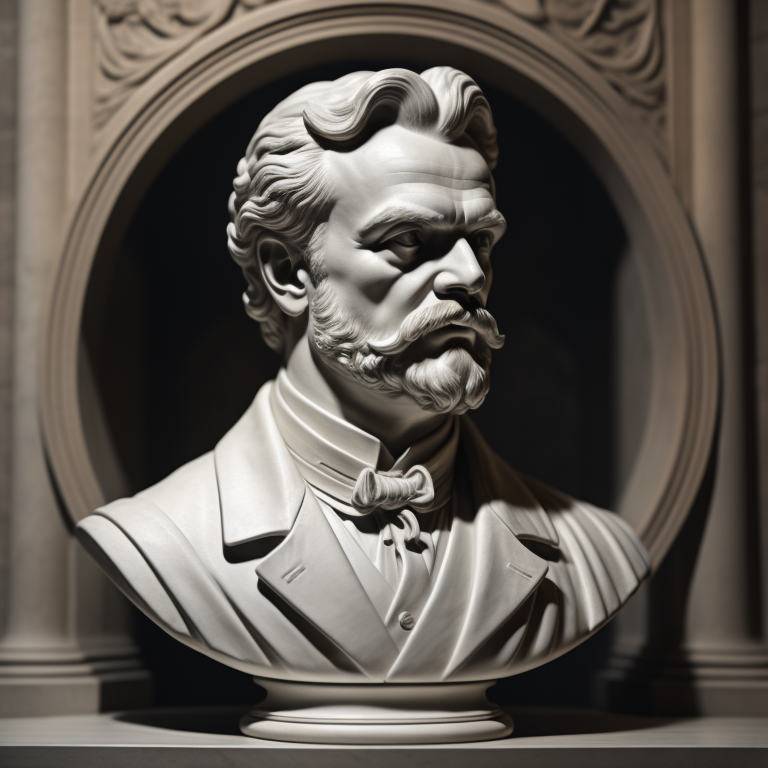
Friedrich Nietzsche
Friedrich Nietzsche: Exploring his Philosophy
Friedrich Nietzsche (1844-1900)
He was an influential German philosopher known for his ideas about the will to power, criticism of traditional morality, and his notion of the “superman.” His work questioned established values and religion, raising ideas that influenced modern philosophy, psychology, and literature. His phrase “God is dead” summarizes his vision of a post-religious world and his search for an ethic based on the affirmation of life.
Main philosophical ideas
Nietzsche questioned traditional moral and religious values, and advocated a new way of life based on individuality, creativity, and willpower.
His most important ideas include:
- The death of God:Nietzsche argues that the idea of God is dead, and that this has left humans without an objective value system.
- The will to power:Nietzsche believes that the driving force of life is the will to power, which is the desire to dominate and control.
- The Superman:The superman is Nietzsche’s ideal for the human being, who is strong, creative and autonomous.
His philosophy in a sentence
Nietzsche’s philosophy can be summarized in the phrase “Live life!”, which means that humans should live their lives according to their own values and desires, without worrying about the rules and restrictions imposed by society.
Explanation of philosophy for a 10 year old child
Imagine that one day you wake up and realize that there are no more Santa Clauses, no fairies, no unicorns. All the fairy tales you have been told are lies. How would you feel?
Nietzsche felt this way when he realized that the idea of God was also a lie. He believed that humans needed to create their own values and live their own lives, without depending on the rules and restrictions imposed by society.
Nietzsche also believed that humans should be strong and creative, and that they should seek adventure and self-improvement. He thought that humans should be the “supermen” of their own lives.
Explanation of philosophy for an adult
Nietzsche’s philosophy is complex and challenging, but it is also very rich and stimulating. His ideas have had a great influence on Western thought, and continue to be relevant today.
If you are interested in learning more about Nietzsche’s philosophy, I recommend reading his books, such as “Thus Spoke Zarathustra” and “The Will to Power.” There are also many books and articles that explain his ideas in a more accessible way.
The positive side of Nietzsche’s philosophy
His philosophy encourages us to be autonomous individuals and live our own lives according to our own values. It frees us from the restrictions of traditional morality and allows us to create our own value systems. Nietzsche also encourages us to be strong and creative, and to seek adventure and self-improvement. He tells us that we should not fear failure, but rather learn from it and move forward.
The negative side of Nietzsche’s philosophy
This philosophy can be very individualistic and dehumanizing. Nietzsche sometimes seems to suggest that humans are just animals fighting for power, and that there is nothing more to it than that. He can also be very nihilistic, meaning that he does not believe in the existence of objective values. This can be discouraging for people searching for meaning in life.
A real-life problem.
Conformity is the tendency of people to follow society’s rules and norms, even when they do not agree with them. Nietzsche believes that conformism is an obstacle to individuality and creativity.
The solution to the problem of conformism using Nietzsche’s philosophy is to learn to think for ourselves and live our own lives according to our own values.
We should not be afraid to be different or go against the grain. We must be strong and creative, and we must seek adventure and self-improvement.
Nietzsche’s philosophy is a complex and challenging philosophy, but it is also very rich and stimulating. His ideas have had a great influence on Western thought, and continue to be relevant today.
Another real-life problem:
Let’s imagine that a person is unhappy with his job. The job is very stressful and he doesn’t like what he does. However, he is afraid to leave his job because he doesn’t know what else to do.
The person could apply Nietzsche’s philosophy in the following way:
First, the person could recognize that conformity is an obstacle to their happiness. Leaving her job would be going against the grain, but the person might decide that it is worth doing so to be happier.
Secondly, the person could learn to think for themselves and live their own lives according to their own values. The person could decide that what matters most to them is being happy, and that it is not worth staying in a job that makes them unhappy.
Finally, the person could be strong and creative, and seek adventure and self-improvement. The person could find a new job that they like more and that makes them happier.
This is just one possible solution to the problem. There are many other ways to apply Nietzsche’s philosophy to real-life problems. The key is to be creative and think for yourself.
The philosophy opposite to that of Nietzsche: Kantianism.
Kantianism is a philosophy that is based on the idea that there are certain moral principles that are universal and objective. These principles are derived from reason, and not from tradition or religion.
Kantianism is opposed to Nietzsche’s philosophy in several aspects. First, Kantianism believes that there are objective values, while Nietzscheanism does not. Second, Kantianism believes that reason is the source of values, while Nietzscheanism believes that the will to power is the source of values. Third, Kantianism believes that humans should act in accordance with the moral law, while Nietzscheanism believes that humans should be free to create their own values.
- The positive aspects of Kantianism
- Kantianism can provide a solid foundation for ethics. Kantian moral principles are universal and objective, meaning that they apply to all human beings, regardless of their culture or religion.
- Kantianism can help people make difficult moral decisions. By relying on reason, Kantianism can help people think clearly and rationally about the moral choices they have.
- Kantianism can promote individual autonomy and freedom. By believing that reason is the source of values, Kantianism can help people be free to create their own value systems.
- The negative aspects of Kantianism
- Kantianism can be too rigid and formalistic. Kantian moral principles may seem too abstract and difficult to apply to everyday life.
- Kantianism may be too individualistic. By focusing on reason, Kantianism can ignore human emotions and feelings.
- Kantianism may be too idealistic. Kantian moral principles can be difficult to follow in the real world.
Nietzsche’s philosophy and Kantianism are two very different philosophies. Nietzsche believes that humans must create their own values and live their own lives according to their own desires. Kantianism, on the other hand, believes that there are certain moral principles that are universal and objective, and that humans must act in accordance with these principles.
The philosophy that is most suitable for a person depends on their personal values and beliefs. Some people may find Nietzsche’s philosophy more appealing, while others may find Kantianism more appealing. Finally, the best philosophy is the one that helps us live a good and meaningful life.

Sources
Books:
- “Así habló Zaratustra” (Also sprach Zarathustra): Una de las obras más influyentes de Nietzsche, en la que presenta las ideas del superhombre y la voluntad de poder a través de las enseñanzas de Zaratustra.
- “Así habló Zaratustra” (Así habló Zaratustra): Una introducción accesible a las ideas clave de Nietzsche y su crítica a la moral tradicional y la religión.
- “Ecce Homo”: En este libro, Nietzsche examina su propia obra y vida, ofreciendo reflexiones profundas sobre su filosofía y su impacto en la cultura.
Websites:






0 comments